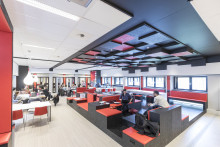According to the plan, the UT will have to make its business operations more sustainable in ten different areas. This ranges from energy and water consumption to buildings, travel, events and purchasing.
The sustainability goals in a nutshell
- A CO2-neutral campus by 2030, a CO2-negative one by 2050.
- A 5% reduction in water consumption by 2022 compared to 2020, a zero water footprint by 2030.
- A (single use) plastic-free campus by 2022, a waste-free campus by 2030 and a circular campus by 2050.
- Halve the CO2 footprint of food and drink on the campus by 2030 compared to 2020. The standard option for work lunches becomes vegetarian in 2020. Each canteen will have one meat-free day a week by 2022.
- Train is the preferred mode of travel for work trips of less than 800 kilometres by 2022. 100% compensation of CO2 emissions from business trips by 2025.
- Apply biodiversity criteria in all decision making concerning green maintenance by 2022.
- All new contracts for products and services will include a list of UT sustainability criteria by 2022. These criteria will be given more weight than they currently have.
- All existing buildings: energy label C by 2022. All UT buildings will be energy-neutral by 2050.
- First plastic-free small event by 2021, first plastic-free large event by 2022. Waste free events by 2030.
- The UT banks with a sustainable bank by 2022.
To a greater or lesser extent, every UT staff member is going to notice the measures for becoming a more sustainable university. ‘It is also the intention that every UT employee in his or her field of work will find a way to become more sustainable,' says Brechje Maréchal, environmental and sustainability policy officer, who wrote the policy paper. ‘Such a policy is a kind of roadmap within which people can find their own way.’
Support
Support is the key word here. 'The last thing you want is for people to start digging their heels into the sand, so it is important to make such a transition as easy as possible for everyone. Actually, you want to impose as few measures as possible, but instead look at what suits people. But it's true that the plans are substantial and comprehensive. For that we need everyone, from drivers like the Green Hub we're setting up, to sceptical employees'.
Some steps are quite easy to take, Maréchal says. Because they are already part of one's own responsibility. Take vegetarian food, for example, as a standard for working lunches. That option is already there, and you can simply check a box. But it's not the standard yet.' At the same time, she knows that such a seemingly simple step is not taken lightly. ‘You also have to make clear agreements with the caterer, for example. And people aren't going to be enthusiastic for bland cheese sandwiches. You have to provide good options and communicate clearly.’
Dot on the horizon
The same applies to other 'low hanging fruit', such as banning the printing of flyers or bike saddle covers for promotion, or 'virgin plastic' that is meant to be banned from events on campus for one-off use. ‘In such cases, too, it's looking for a workable mode for everyone,' says Maréchal.
Other goals are very far away and are also described as 'difficult' in the policy document. Maréchal: 'The UT has Shaping2030, the government is talking about a circular economy in 2050. Some things, such as full recycling of water on campus, sound far away and are not possible today. But it is important to keep such targets in sight. We can work towards this, step by step and consciously.'
Plans for 2020
For the implementation of the first concrete plans, about 400 thousand euros is needed this year. These first plans are described in the Implementation Plan 2020. ‘We specifically focus on two themes this year: waste and mobility,' says Maréchal. ‘In addition, a number of initiatives are already underway, which the UT wishes to continue to facilitate. These include, for example, initiatives in the field of catering in consultation with Appèl, making events more sustainable, the development of an open data platform for sustainability – like the platform for energy – energy reduction and making purchasing more sustainable.’
The corona crisis will also have an impact on these plans, Maréchal thinks. ‘Probably not everything we had in mind for 2020 can be implemented, but we try to keep people as well informed as possible.’
The Executive Board recently agreed to this policy plan. The University Council will discuss it in May.







